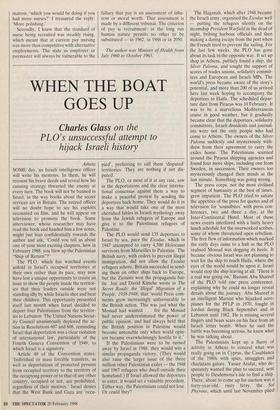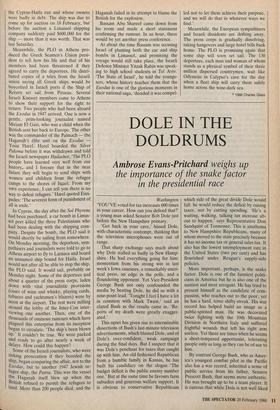WHEN THE BOAT GOES UP
Charles Glass on the
PLO's unsuccessful attempt to hijack Israeli history
Athens SOME day, an Israeli intelligence officer will write his memoirs. In them, he will recount his brave deeds and reveal how his cunning strategy thwarted the enemy at every turn. The book will not be banned in Israel, in the way books about the secret services are in Britain. The retired officer will no doubt hope to see his exploits recounted on film, and he will appear on television to promote the book. Some interviewer, whose researcher may have read the book and handed him a few notes, might just lean confidentially towards the author and ask, 'Could you tell us about one of your most exciting chapters, how in February 1988, you blew up the Palestinian "Ship of Return"?'
The PLO, which has watched events unfold in Israel's occupied territories at their own rather than its pace, may now have lost a unique opportunity to create an issue to show the people inside the territor- ies that their leaders outside were not standing idly by while Israelis shot and beat their children. This opportunity presented itself last month when Israel decided to deport four Palestinians from the territor- ies to Lebanon. The United Nations Secur- ity Council unanimously deplored the ac- tion in Resolutions 607 and 608, reminding Israel that deportation was a clear violation of international law, particularly of the Fourth Geneva Convention of 1949, to which Israel is a signatory.
Article 49 of the Convention states: 'Individual or mass forcible transfers, as well as deportations of protected persons from occupied territory to the territory of the occupying power or to that of any other country, occupied or not, are prohibited, regardless of their motives.' Israel denies that the West Bank and Gaza are 'occu- pied', preferring to call them `disputed' territories. They are nothing if not dis- puted.
The PLO, or most of it at any rate, saw in the deportations and the clear interna- tional consensus against them a way to make a peaceful protest by sending the deportees back home. They would do it in a way that would take one of the most cherished fables in Israeli mythology away from the Jewish refugees of Europe and give it to the Palestinian refugees of Palestine.
The PLO would send 135 deportees to Israel by sea, pace the Exodus, which in 1947 attempted to carry 4,500 Holocaust survivors from Marseilles to Palestine. The British navy, with orders to prevent illegal immigration, did not allow the Exodus refugees ashore. Britain succeeded in send- ing them on other ships back to Europe, but the Zionists won the propaganda bat- tle. Jon and David Kimche wrote in The Secret Roads: the 'Illegal' Migration of a People, 1938-1948, that 'world Press com- ments grew increasingly unfavourable to the British action. This was just what the Mossad had wanted . . . for the Mossad had never underestimated the power of public opinion, and had always held that the British position in Palestine would become untenable only when world opin- ion became overwhelmingly hostile to it.'
If the Palestinians were to be turned away by Israel in 1988, they would win a similar propaganda victory. (They would also raise the larger issue of the three million other Palestinian exiles — the 1948 and 1967 refugees who dwell outside their homeland.) If Israel allowed the deportees to enter, it would set a valuable precedent. Either way, the Palestinians could not lose. Or could they? The Haganah, which after 1948 became the Israeli army, organised the Exodus well — putting the refugees silently on the steamship President Warfield in the dead of night, bribing harbour officials and then making a daring escape from the port when the French tried to prevent the sailing. For the last few weeks, the PLO has gone about its task in the opposite way. It set up shop in Athens, publicly found a ship, the Silver Paloma, and sought the support of scores of trades unions, solidarity commit- tees and European and Israeli MPs. The world's press became aware of the story's potential, and more than 200 of us arrived here last week hoping to accompany the deportees to Haifa. The scheduled depar- ture date from Piraeus was 10 February. It was to be a marvellous Mediterranean cruise in good weather, but it gradually became clear that the deportees, solidarity committees, Israeli dissidents and journal- ists were not the only people who had come to Athens. The owners of the Silver Paloma suddenly and mysteriously with- drew from their agreement to carry the exiles home. The Palestinians scurried around the Piraeus shipping agencies and found four more ships, including one from Sweden, in succession. Their owners too mysteriously changed their minds at the last minute. Something was going wrong.
The press corps, not the most civilised segment of humanity at the best of times, grew impatient. The PLO tried to satiate the appetites of the press for quotes and of television for `soundbites' with press con- ferences, two and three a day, at the Inter-Continental Hotel. Most of these news events interfered with a fairly heavy lunch schedule for the overworked scribes, some of whom threatened open rebellion. The free flow of information which marked the early days came to a halt as the PLO realised Mossad was dogging its heels. It became obvious Israel was not planning to wait for the ship to reach Haifa, where the eyes of the world would be upon it. Israel would stop the ship leaving at all. `There is a real war going on,' Bassam Abu Shareef of the PLO told one press conference, explaining why he could no longer reveal details about the journey. Abu Shareef is an intelligent Marxist who hijacked aero- planes for the PFLP in 1970, fought in Jordan during Black September and in Lebanon until 1982. He is missing several fingers and bears scars on his face from an Israeli letter bomb. When he said the battle was becoming serious, he knew what he was talking about. The Palestinians kept up a flurry of activity in Athens to conceal what was really going on in Cyprus, the Casablanca of the 1980s with spies, smugglers and charlatans galore. Yasser Arafat, who de- sperately wanted the plan to succeed, sent people to Desdemona's isle to find a ship. There, about to come up for auction was a forty-year-old, rusty ferry, the Sol Phyrene, which until last November plied the Cyprus-Haifa run and whose owners were badly in debt. The ship was due to come up for auction on 18 February, but before the auction a Limassol shipping company suddenly paid $600,000 for the ship — more than it was worth. That was last Saturday.
Meanwhile, the PLO in Athens pro- duced the Greek Seamen's Union presi- dent to tell how his life and that of his members had been threatened if they agreed to carry the deportees. He distri- buted copies of a telex from the Israeli union saying all Greek ships would be boycotted in Israeli ports if the Ship of Return set sail from Piraeus. Several Israeli Knesset members came to Athens to show their support for the right to return. Two people who had been aboard the Exodus in 1947 arrived. One is now a gentle, prim-looking journalist named Miriam El Gazi, who was a child when the British sent her back to Europe. The other was the commander of the Palmach — the Haganah's elite unit on the Exodus — Yossi Harel. Harel boarded the Silver Paloma before it was withdrawn and told the Israeli newspaper Hadashot, 'The PLO people have learned very well from our history, and I foresee that in the near future they will begin to send ships with women and children from the refugee camps to the shores of Israel. From my own experience, I can tell you there is no way to defeat refugees.' Harel quoted Euri- pedes: 'The severest form of punishment of all is exile.'
In Cyprus, the day after the Sol Phyrene had been purchased, a car bomb in Limas- sol port killed the three Palestinians who had been dealing with the shipping com- pany. Despite the bomb, the PLO said it would shortly be sailing from somewhere. On Monday morning, the deportees, sym- pathisers and journalists were told to go to Athens airport to fly to Larnaca and board an unnamed ship bound for Haifa. Israel would not after all be able to stop the ship, the PLO said. It would sail, probably on Monday night. Some of the deportees and about a quarter of the press corps, laden down with vital journalistic provisions (cases of wine and whisky, playing cards, tobacco and yachtsmen's blazers) were by noon at the airport. The rest were milling around the lobby of the Inter-Con inter- viewing one another. Then, one of the thousands of ominous rumours which have plagued this enterprise from its inception began to circulate: 'The ship's been blown UP.' It couldn't be true. We were packed and ready to go after nearly a week of delays. How could this happen?
Some of the Israeli journalists, who were risking prosecution if they boarded the ship, began comparing the affair, not to the Exodus, but to another 1947 Jewish re- fugee ship, the Patria. This was the vessel the Haganah itself blew up when the British refused to permit the refugees to land. More than 200 people died, and the Haganah failed in its attempt to blame the British for the explosion.
Bassam Abu Shareef came down from his room and made a short statement confirming the rumour. In an hour, there would be yet another press conference.
At about the time Bassam was accusing Israel of planting both the car and ship bombs in Limassol, and promising the voyage would still take place, the Israeli Defence Minister Yitzak Rabin was speak- ing to high school students in Tel Aviv. `The State of Israel', he told the youngs- ters, whose history teaches them that the Exodus is one of the glorious moments in their national saga, 'decided it was compel- led not to let them achieve their purpose, and we will do that in whatever ways we find.'
Meanwhile, the European sympathisers and Israeli dissidents are drifting away. The press corps is gradually dissolving, taking hangovers and large hotel bills back home. The PLO is promising again that some ship will soon set sail. The 130 deportees, each man and woman of whom stands as a physical symbol of their three million dispersed countrymen, wait like Odysseus in Calypso's cave for the day when a fleet ship will carry them safely home across the wine-dark sea.
1988 Charles Glass



















































 Previous page
Previous page